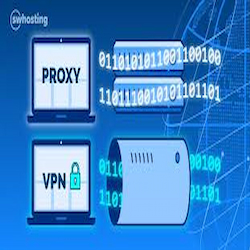As worries about online security and privacy grow, more people are searching for methods to safeguard their digital activity. Proxy servers and virtual private networks (VPNs) are two common solutions for this purpose. This post will explain the distinctions between VPNs and proxies as well as the benefits and drawbacks of each.
What are VPNs and proxies?
VPNs and proxies reroute your internet traffic through a distant server in order to conceal your IP address. However, the difference is that a VPN encrypts all of your internet traffic for enhanced protection and privacy, whereas a proxy only works with one app or service.
Both a VPN and a proxy will conceal your IP address when you connect to a server, substituting the server’s IP address. However, only a VPN can encrypt your internet traffic, guaranteeing that your online activities stay hidden.
Although a proxy can be used for simple web browsing, a VPN offers more sophisticated functionality and a higher level of protection.
READ ALSO: The Amazon Echo Dot With Alexa
VPNs and Proxies, How Do Proxy and VPNs Compare?
Commonalities Between Proxy Servers and VPNs
The IP address of your device is concealed by both proxy servers and VPNs.
Gaming and Streaming Compatibility:
VPNs and proxies are both compatible with gaming consoles and streaming services, albeit proxies need a SOCKS5.
Effect on Browsing Speeds:
Although proxies are often slower than VPNs, both techniques have the potential to reduce your browsing speed.
Get around geo-restrictions:
You can get around government internet limitations with both.
Crucial! Remember to verify the security of each piece of software you install. This holds true for other software as well, particularly those that get beyond certain limitations, not just VPN apps or proxies. Simply reading the Bluestacks security audit from professionals—in this case, VeePN—will accomplish this.
VPNs and Proxies, What Makes Them Different?
What distinguishes a VPN client from an anonymous proxy is the primary query. Knowing these distinctions will help you determine what is best for you.
Encryption: This is the main way that a VPN differs from a proxy server. VPNs conceal both your private IP address and the websites you view by encrypting all of your online activities. However, proxy servers just alter your IP address but do not encrypt your internet activity.
Selling Data: Although the majority of proxy servers are free, they frequently sell user data to marketers to cover their expenses. However, the majority of VPNs are commercial services that usually don’t record or share customer traffic information.
Paid vs. Free: Although there are free VPN choices, they typically have restrictions on server switching, daily data usage, and other features. Even during the free trial time, there are VPN extensions for Chrome and other browsers that are fairly effective. Purchasing a premium VPN is frequently the best option for complete safety. On the other hand, the majority of proxy servers are free.
Coverage: Regardless of the website or application being utilized, a VPN encrypts every user’s online activity.
VPNs and Proxies, Comparing Three Important Factors to Determine Whether to Use a VPN or Proxy
There are advantages and disadvantages to everything. There are always tradeoffs involved in making a choice. It costs money and time to even create a software company page, but the results include more leads, a rise in customer confidence, and the establishment of brand authority. The same is true for proxies or VPNs. When deciding between them, it seems sense to compare these three important factors.
Speed
Connection speeds may be slowed down by proxies, which are single servers that are utilized by numerous users concurrently. Even slower connections may occur while using a free proxy. In a similar vein, distant VPN servers may potentially cause connection lag. Any delays, however, will be minimized and hardly perceptible by a well-maintained VPN service equipped with the appropriate equipment.
Privacy
Proxy servers do not encrypt your connection, but they can conceal your identity from websites. This indicates that a less secure connection is the outcome of using a public proxy server. VPNs, on the other hand, are a more safe option because they encrypt your data before sending it, concealing your identity from the internet and your ISP.
Conclusion: Why Opt for a VPN?
Covers All Websites and Apps: If you want complete coverage, a VPN is the best choice.
Encrypted Web Traffic: VPNs encrypt all of your browsing activity, in contrast to proxies.
No Traffic Logging: Unlike proxy servers, the majority of VPNs do not keep track of your browser history.
Faster in general: Although VPN speeds can differ, they are usually quicker than proxies.
Reasons to go for a VPN:
For One-Time Use: In circumstances requiring only one use, proxies may be more convenient and less expensive.
Cost: The majority of VPNs require a paid membership; however, some are free or provide trials. Most of the time, proxies are free.
You can make a better choice now that you are aware of the advantages and disadvantages!



